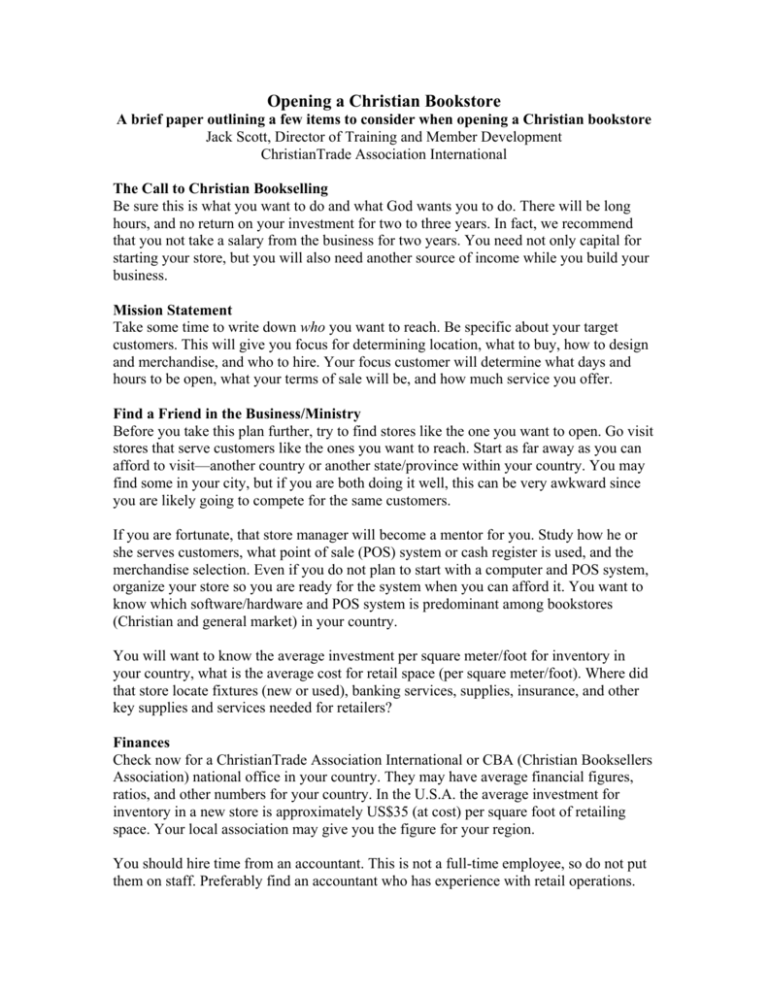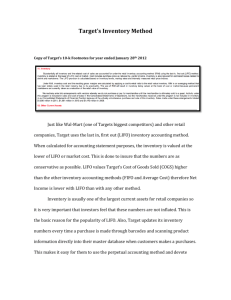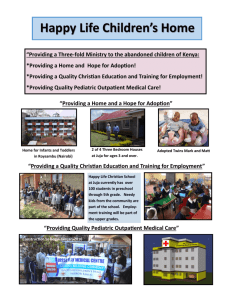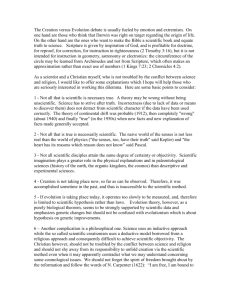Opening a Christian Bookstore - ChristianTrade Association
advertisement

Opening a Christian Bookstore A brief paper outlining a few items to consider when opening a Christian bookstore Jack Scott, Director of Training and Member Development ChristianTrade Association International The Call to Christian Bookselling Be sure this is what you want to do and what God wants you to do. There will be long hours, and no return on your investment for two to three years. In fact, we recommend that you not take a salary from the business for two years. You need not only capital for starting your store, but you will also need another source of income while you build your business. Mission Statement Take some time to write down who you want to reach. Be specific about your target customers. This will give you focus for determining location, what to buy, how to design and merchandise, and who to hire. Your focus customer will determine what days and hours to be open, what your terms of sale will be, and how much service you offer. Find a Friend in the Business/Ministry Before you take this plan further, try to find stores like the one you want to open. Go visit stores that serve customers like the ones you want to reach. Start as far away as you can afford to visit—another country or another state/province within your country. You may find some in your city, but if you are both doing it well, this can be very awkward since you are likely going to compete for the same customers. If you are fortunate, that store manager will become a mentor for you. Study how he or she serves customers, what point of sale (POS) system or cash register is used, and the merchandise selection. Even if you do not plan to start with a computer and POS system, organize your store so you are ready for the system when you can afford it. You want to know which software/hardware and POS system is predominant among bookstores (Christian and general market) in your country. You will want to know the average investment per square meter/foot for inventory in your country, what is the average cost for retail space (per square meter/foot). Where did that store locate fixtures (new or used), banking services, supplies, insurance, and other key supplies and services needed for retailers? Finances Check now for a ChristianTrade Association International or CBA (Christian Booksellers Association) national office in your country. They may have average financial figures, ratios, and other numbers for your country. In the U.S.A. the average investment for inventory in a new store is approximately US$35 (at cost) per square foot of retailing space. Your local association may give you the figure for your region. You should hire time from an accountant. This is not a full-time employee, so do not put them on staff. Preferably find an accountant who has experience with retail operations. Go to www.cbaonline.org and download the “chart of accounts” for CBA America member stores. This is a way of organizing the expenses in your business. Then your accountant can set up these accounts for your store and you can pay your bills, purchase merchandise, buy advertising and incur other expenses, and organize them according to industry standards. You may want to go to a local business school or college for an introductory course in financial management. You do not want to become a bookkeeper, but you want to be able to read your profit-and-loss statement and balance sheet to truly understand your business. Once you have mastered those financial statements, learn to read the “Sources and Uses of Cash” (cash-flow statement). Then, download the “Open-to-buy” spreadsheet at www.cbaonline.org and begin to bring your cash under better control. Lease or Buy? In many parts of the world, this is not a choice; there just is not affordable commercial real estate to purchase. Regardless of whether you buy or lease, you must know whether the costs of occupancy are affordable for a Christian bookstore. Just because another retailer has been there (say, jewelry or women’s clothing store), doesn’t mean a bookstore will be able to afford that rent. Your national Christian trade association (find a list at the ChristianTrade Web site: www.CTAIntl.com) is valuable to help you understand the average cost for occupancy (including rent, electricity, heating/air conditioning, and any other costs related to using the space) in your country. Opening Trade Accounts When you have lined up your location and know how much space you will have for your business, you need to get your information together and approach vendors. You will be asked to complete a trade application form. Again, your local Christian trade association may have a standardized trade application for the industry. If you plan to order from abroad, you will want to establish trade relations with one or more of the distributors who handle multiple suppliers. If you are ordering from the United States, these would include STL, Spring Arbor/Ingram International, and Anchor. From the UK this would include STL and others. You may also want to order directly from publishers, music companies, and gift vendors, but you will first need to have established a trade account with the distributor(s). Inventory Management Many businesses that fail are actually profitable, they simply run out of cash. All their money is tied up on the shelves of their store. You must be able to turn over that merchandise. The concept of inventory turns is the number of times each year you totally refresh the products you are selling. Thus, if you have a three-time turn, you average a “new store” every four months. Products should be organized into broad departments (Books, Bibles, Gifts, Music, Cards, etc.) and then categories (e.g. within books you will have categories for Bible Study, Christian Living, Fiction, Family, etc.) To achieve better inventory management, you will want to begin tracking your sales by item, category, and department. If you do not have a computerized POS, you will want to begin ringing your sales through at least by departments, and preferably by categories. As your store grows, the categories may become too many for your cash register, and that will tell you when you need to seriously consider buying a computer and software. When you are ready to purchase a POS system, you will want to know if the vendor can help you set up a database for your merchandise. Having a database that is set up for Christian products in your country will save you much time and be far more accurate. Your POS system or your accountant will provide you with this key ratio for managing your inventory. For example, the formula for “Inventory Turnover” is simply Net Sales divided by Inventory at Retail. This ratio is key to measuring how well you are managing the inventory and it will allow you to compare departments and categories in your store, and to compare your store to others in your country and the rest of the world. Merchandising You need fixtures to display your products neatly, clearly and in a way that will protect the merchandise. Fixtures also indicate clearly each department within your store. You should not sell gifts on bookshelves, and your books should not be regularly sold off a flat gift shelf. Never buy fixtures from a druggist for selling books. Each fixture system is specifically designed to present and protect its own category of merchandise. You need fixtures that will hold the merchandise so customers can see it immediately and know what the category is. Fixtures should shelve merchandise so it stays clean and undamaged. You will likely want to place the cash register in the front of your store. Also place fixtures in the front of the store that clearly present these categories: “New,” “Bestsellers” and “On Sale” merchandise. Time and again around the world, surveys show these are the three areas customers are most interested in finding quickly when they walk into a store. Determine the categories you will use to organize the inventory in your store. As you buy and set up your inventory in your POS system, you will want to place that merchandise in the correct category so when it arrives it can be shelved/displayed in the right location and found on your computer later. Signs should be ordered to clearly label the departments and categories. They allow customers to serve themselves and become “silent salespersons.” Avoid handwritten signs. Use your logo and determine a font (type face) for your store. Use only your logo and font repeatedly on signs throughout the store. Even if you do not use a computer as a POS system, you can use a computer and printer to assure consistent, clear, clean, customer-friendly signs within your store and to create posters you will send out to churches and families. Get carts to carry your merchandise and keep the aisles clear and accessible at all times. Never stack merchandise on the floor, including in the cash register area. Keep it neat and clean so customers can easily find your staff and complete their transactions. If you have time to lean, you have time to clean! Assign cleaning, dusting, vacuuming, and scrubbing areas to each person. Keep glass sparkling and inviting to customers. Be sure each staff member realizes that keeping the store neat and clean is everyone’s job. If they are not willing to clean, they won’t make a good retailer. Marketing Your Store As a part of any business plan, think through how you are going to advertise and promote your store. Will you have handouts and small posters for local churches, send notices to local senior citizen centers or libraries, host events like reading clubs, host author signings, pastor’s breakfasts and/or Christian education fares? Will you build a Web site, run an ad in the local phone directory, and sponsor a page in the Sunday newspaper? These events, promotions, and expenses should be planned out on an annual calendar, carefully investing your money in those periods throughout the year when you expect the most sales. Go fishing when the fish are biting; don’t spend advertising money needlessly during those times when your sales are low. Your national Christian trade association may sponsor catalogs or other advertising tools. You may have buying or marketing groups within your nation. Your vendors may have free or low-cost catalogs, fliers or postcards you can hand out or place in your bags for customers. Employee Hiring/Training Hiring policies vary greatly by country. Some countries do not allow you to ask about religious faith or marital status, some require special registration with local and national authorities. Look to your local trade association, merchants association, or chamber of commerce to find out your local laws and regulations regarding hiring. As you establish a business, you will want your staff to reflect the customers you wish to serve. So, if you want to serve women, you need women on staff. If you want to sell contemporary music to teens, you must hire teens. Also consider various denominations and ethnic diversity as you choose staff representatives. Look for National Christian trade conventions and ChristianTrade Association International conventions and Seminars Many countries have national associations or organizations that plan regional or nationwide conventions for Christian trade participants. If there is one in your country, you ought to attend. The networking, training, product knowledge, inspiration can be invaluable. ChristianTrade Association International offers Marketsquare Europe (in Amsterdam), Marketsquare Asia (in Hong Kong), and Marketsquare Caribbean (in Trinidad & Tobago). Each convention includes several hours of seminars on how to run your business. Plan to attend, meet other retailers and vendors in your area, and develop a network of informal counselors. At the ChristianTrade web site (www.CTAIntl.com) you can find links to national Christian trade associations and their meeting and convention times. Final Comment Opening a Christian bookstore is a challenging assignment. It is very costly and time consuming. A recent CBA America board chairman once said, “During the first five years after the opening of my store, I worked an average of 60 hours a week and never once took a salary.” This experience is not uncommon. The ministry of Christian bookselling is wonderful and rewarding, but it is also a great deal of hard work.








